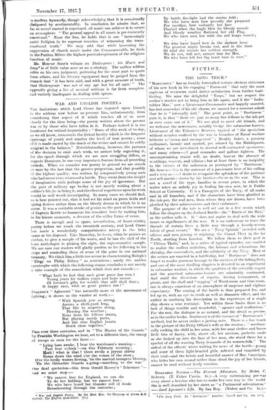WAR AND ENGLISH POETRY..
Tue limitations which Lord Crowe has imposed upon himself in the address now before us prevent him, unfortunately, from considering that aspect of it which touches all of us most elmely for the time being—the poetry written about the present war or by those who have fallen in it. Perhaps indeed it is too imminent for critical impartiality : " Some of this work of to-day, as we all know, transcends the lyrical faculty which is the frequent appanage of youth and reaches the level of true poetry ; some of it is made sacred by the death of the writer and cannot be coldly weighed in the balance." Notwithstanding, however, the juntuess of the decision to omit smell work, we cannot help regretting it, for the epoch through whirls lea are now struggling differs, as regards literature, in one very important feature from all preceding ticriode, When we consider war poetry in general we are struck at once by the fact that the greeter proportion, and that possibly of the highest quality, was written by comperatively young men who had never even witnessed a battle. They wrote from the insight of imagination with perhaps some of the joy of ignorance. But the poet of military age to-day is not merely writing about. a soldier's life, he is living it, and the effect of experience upon his work would be well worth investigating. In many cases wo should find, as is here pointed out, that it bad set his mind on green fields and spring flowers rather than on the bloody drama in which he is an actor. It was a veritable stroke of genius On the part of the creator of Captain Kettle to humanize his truculent hero by making him, in his leisure moments, a devotee of the stiller forme of verse.
There is enough and to spare, nevertheless, of heart-stirring poetry before we touch the twentieth century, and Lord Crewe has made a wonderfully comprehensive survey in the brief space at his disposal. Like 3laeaulay, be loves, when be praises en author, to give a sample of his wares, and he has the skill of the bons anthologist in picking the right, the representative sample. We are sure our readers will gladly pardon tie for following in his steps and reminding them of some of the gems in our national treasury. We think him a little too severe in characterizing Ralegh's " Elegy on Philip Sidney " as sententious : surely the sudden apostrophe with which tho following stanza concludes is not merely a trite example of the consolation which does not console :—
" What bath he lost that such great grace has won Young years for endless years and hope unsure Of fortune's gifts for mental that still shell dare; 0 happy race, with as great praises run I " Drayton's " Agincourt, " has naturally more of the movement of lighting ; it shows no the warrior at work " With Spanish yew so strong, Arrows a cloth-yard long, That like to serpents stung, Piercing the weather ; None from his fellows starts, But playing manly parts, And like true English hearts Stuck close together."
Pass over three centuries, and in " The Muster of the Guards "
by Franklin Washington we hear, sot to a different time, the tramp
of troops en route for the front :- ' Lying here awake, I hear the watelitnaMs warning- ' Past four• o'clock'—on this February morning ; Rack : what is that I there swells a joyous shiver Borne dawn the wind o'er the voices of the river ; O'er tire lordly waters flowing, 'tis the martial trumpets blowing, 'Tie the Grenadier Guards a-going—marching to the war."
one final quotation—this from Gerald Maierey's " hiker/nen "— and. we must stop :- " We cannot, fear for England, we can die To do her bidding, but we cannot fear We who have heard her thunder roll of deeds Reverberating through the centuries ;
• War and Emplish Podry. By th• Most Hon. the Marquess of Crews, K.O. Oxford: The English Association. [13.! By battle fire-light had the stories told ; We who have seen how proudly she prepared For sacrifice, how radiantly her face Flashed when the bugle blew its bloody sounds And bloody weather fluttered her old Flag, We who have seen her with the red heaps round ; We who have hoard how in the darkest hour Tito greatest might breaks out, and in the time Of trial she reveals her noblest, strength. We do not, will not, cannot fear for Her, We who have felt her big heart beat in ours."














































 Previous page
Previous page